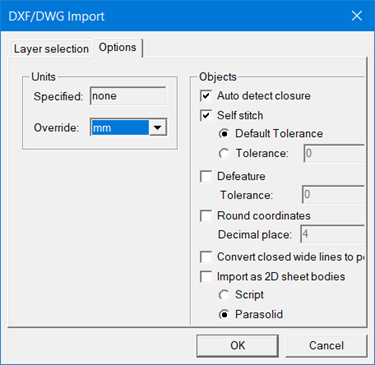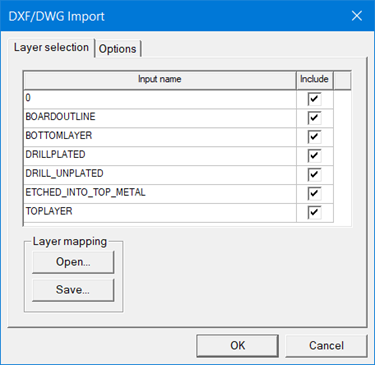Importing DXF and DWG Format Files
You can import AutoCAD versions 2.5 (AC1002) through 2012 (AC1024) on Linux and versions 2.5 (AC1002) through 2017 (AC1027) on Windows. The entities are imported as 2D, not 3D. The types of entities imported are
- 2D Polyline
- Polyline
- Line
- Arc
- Circle
- Ellipse
- Solid
- Block
To import a .dxf or .dwg model file (which may use an associated .tech file):
- Click Modeler > Import.
- Select AutoCAD Files (*.dxf;*.dwg) from the Files of type drop-down menu.
- Use the file browser to find the file you want to import.
- Select the .dxf/.dwg model file you want to import.
- Click Open.
- Use the Include check boxes to specify which layers to import from the selected file.
- You can use the browse button [...] to locate a Layer mapping file. The layer mapping file is a plain text file that includes units, layer names, color, elevation, and thickness information.
- Click the Options tab.

- Use the Override drop-down to select the layout units for the imported file (default is mm).
- Use the Objects check boxes to fine-tune the import:
-
Auto detect closure causes polylines to be checked to see whether or not they are closed. If a polyline is closed, the modeler creates a polygon in the design.
-
Self stitch causes multiple straight line segments to be joined to form polylines. If the resulting polyline is closed, a polygon is created in the modeler.
-
Default Tolerance/Tolerance specifies whether you can specify a self stitch Tolerance value. If particular features in a model are outside of a normal tolerance allowance, you can set a Tolerance for importing that specific model.
-
-
Defeature Tolerance removes certain small features in the imported geometry to reduce complexity. The features that are removed include multiple points placed within the specified distance, thin or narrow regions (“thins” and “spikes”), and extraneous points along straight line segments.
-
Round coordinates to Decimal place rounds all imported data to the specified number of decimal points.
-
Convert closed wide lines to polygons imports wide polylines as polygons. You have more flexibility to change the shape of such an object when it is imported as a polygon.
-
Import as 2D sheet bodies causes imported objects to be organized in terms of 2D sheets.
- For Import method, select Script or Parasolid.
- When you have completed selections on all tabs, click OK on any tab.
The Import File dialog box appears.
Initially, the DWG/DXF Import dialog opens with the Layer selection tab displayed:

The Input name field shows the name of the layer in the DXF/DWG file (not editable).
units um
//Layer_Name Color Elevation Thickness
BOTTOMLAYER purple 0 200
MIDLAYER green 500 200
TOPLAYER blue 1000 200
The file is imported into the active Layout window.
